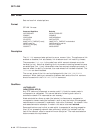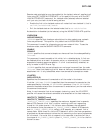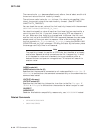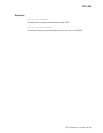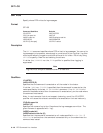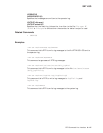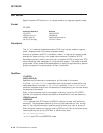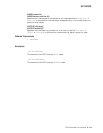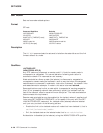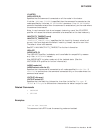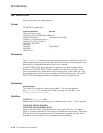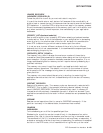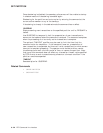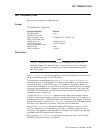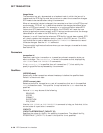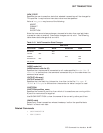
SET NODE
SET NODE
Sets various node related options.
Format
SET node
Command Qualifiers Defaults
/AUTOISOLATE /NOAUTOISOLATE
/CLUSTER /NOCLUSTER
/INACTIVITY_TIMEOUT[=secs] /INACTIVITY_TIMEOUT=60
/ISOLATE /NOISOLATE
/NODE=node-list /NODE=default-node-list
/OUTPUT[=file-spec] /OUTPUT=stdout
Description
The
SET NODE
command sets the automatic isolation characteristics and the link
timeout default of a node.
Qualifiers
/AUTOISOLATE
/NOAUTOISOLATE (D)
Any RTR node may disconnect a remote node if it finds the remote node is
unresponsive or congested. The normal behavior following such action is
automatic network link reconnection and recovery.
Node autoisolation allows a node (the isolator) to disconnect a congested or
unresponsive remote node (the isolatee) in such a way that when the congested
node attempts to reconnect it receives an instruction to close all its network links
and cease connection attempts. A node in this state is termed isolated.
Some applications require that a node which is suspected of causing congestion
(that is, not processing network data sufficiently quickly) is isolated from the
rest of the network, so as to cause minimum disruption. The node autoisolation
feature meets this requirement.
Remote node autoisolation may be enabled (at the isolator) where it applies to all
links using SET NODE/AUTOISOLATE, or for specific links only with the SET
LINK/AUTOISOLATE command. An isolated node (isolatee) remains isolated
until you carry out both of the following actions:
• Enable the link to the isolated node on all nodes that have isolated it, that is
set link [isolated-node]/enable
• Exit the isolated state on the isolated node, that is
set node/noisolate
Autoisolation is disabled (at the isolator) using the /NOAUTOISOLATE qualifier.
6–120 RTR Command Line Interface



